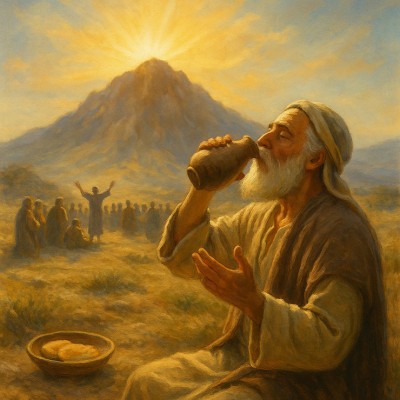
In this week’s parshah, the Torah commands: “V’nishmartem me’od l’nafshoseichem, ki lo re’isem kol temunah…”—“You shall be very careful with your souls (your lives), for you did not see any image…” (Devarim 4:15). The Torah here links our obligation to protect our health with the fact that Hashem revealed Himself at Sinai without any physical form.
But what’s the connection? Why does the Torah place the mitzvah of safeguarding our well-being next to the description of how Hashem revealed Himself? What does physical health have to do with a non-physical Divine appearance?
I heard a remarkable explanation from my father, Rav Yitzchok Fingerer shlit”a. Quoting the Chozeh of Lublin, he explained that this juxtaposition teaches a profound lesson. If a person wishes to be spiritual—if one wants to serve Hashem and live a life of holiness—he must not neglect his physical health.
We might assume that in order to become truly spiritual, we must disconnect from our bodily needs. But the Torah tells us otherwise. When Hashem came down to Sinai, He did not assume any form. He remained completely spiritual—because He is G-d. We, however, are human. And our path to spiritual growth must account for the human experience.
The Chozeh teaches: If you wish to emulate Hashem and live a godly life, recognize your limitations. Don’t try to become overly ascetic or super-spiritual by neglecting your body. Instead, acknowledge that you are physical—and that Hashem wants you to care for your body with the same intention and discipline you use to care for your soul. Eat well. Sleep properly. Take care of your emotional and physical needs. Hashem gave you a body for a reason, and He wants you to use it to serve Him with joy.
Rav Zelig Pliskin shlit”a relates a poignant story that illustrates this point. One morning, the grandson of the Chofetz Chaim zt”l tragically passed away. The household was engulfed in mourning. People sat crying, overwhelmed with sorrow.
Yet amid the grief, the Chofetz Chaim called someone over and asked that food be brought and served to the family. The man was shocked. “Now? Before the levayah?” he asked.
The Chofetz Chaim responded simply: “The funeral will take a long time, and the burial will be delayed. Everyone must eat now.”
Rav Yeruchem commented that this is the wisdom of a Torah giant. The Chofetz Chaim understood that health is not secondary—it is central. Even while mourning a loved one, the mitzvah to preserve life and maintain health must not be pushed aside. He viewed nourishing the body as a mitzvah like any other, one that enables a person to continue serving Hashem.
This lesson is timeless. We must take care of ourselves—physically, emotionally, and mentally—not in spite of our spirituality, but because of it. The more we preserve our health, the more energy and joy we will bring to our avodas Hashem.
Aryeh Fingerer is a passionate Jewish speaker who connects with readers around the world through his meaningful and relatable divrei Torah. He’s dedicated to spreading positivity and strengthening our bond with Yiddishkeit through stories, insights, and timeless Torah values.
Listen to our podcast, Jewish ‘n Joyful, on all streaming platforms! Sign up for our email list or join our WhatsApp group by emailing This email address is being protected from spambots. You need JavaScript enabled to view it. or texting 646-397-2320.
Our weekly newsletter is filled with Torah insights, inspiring stories, and uplifting thoughts on the parshah. Check out www.parshaknowledge.com for more info.
Wishing you a wonderful Shabbat and a smile!
Parshat Va’Etchanan: Health At Sinai
Typography
- Smaller Small Medium Big Bigger
- Default Helvetica Segoe Georgia Times
- Reading Mode




